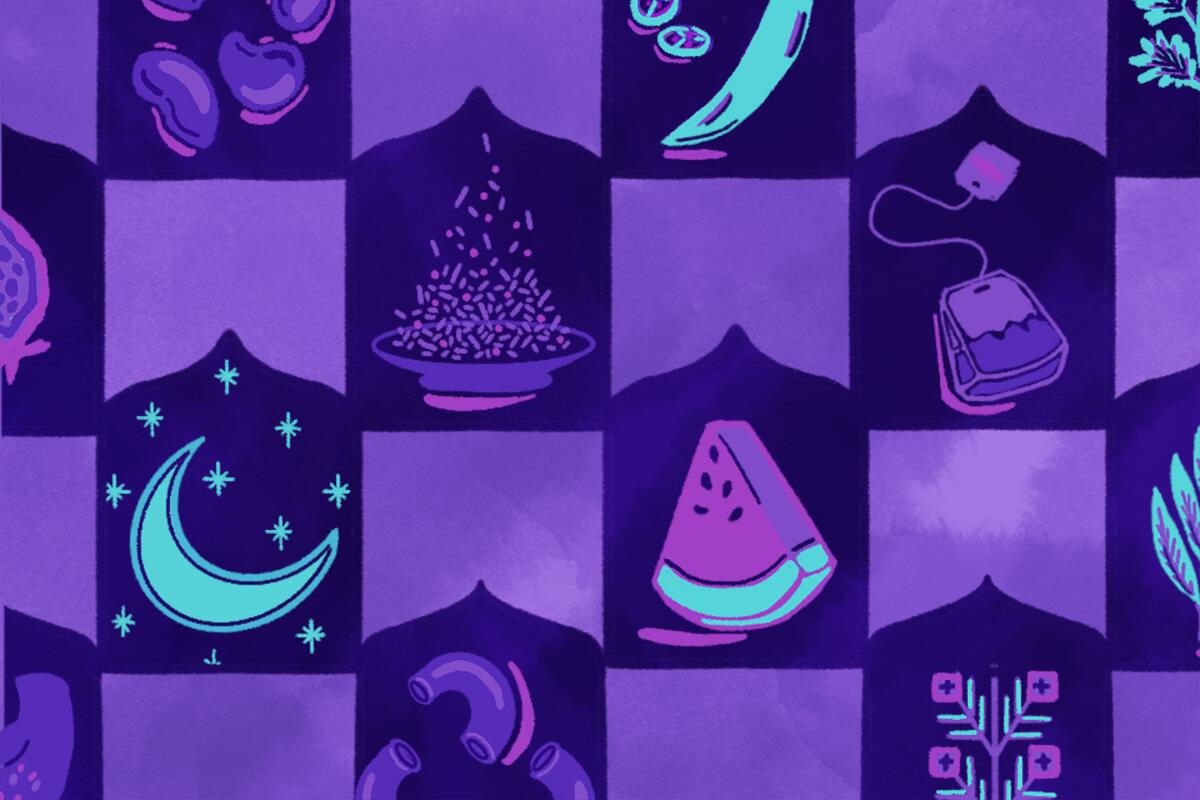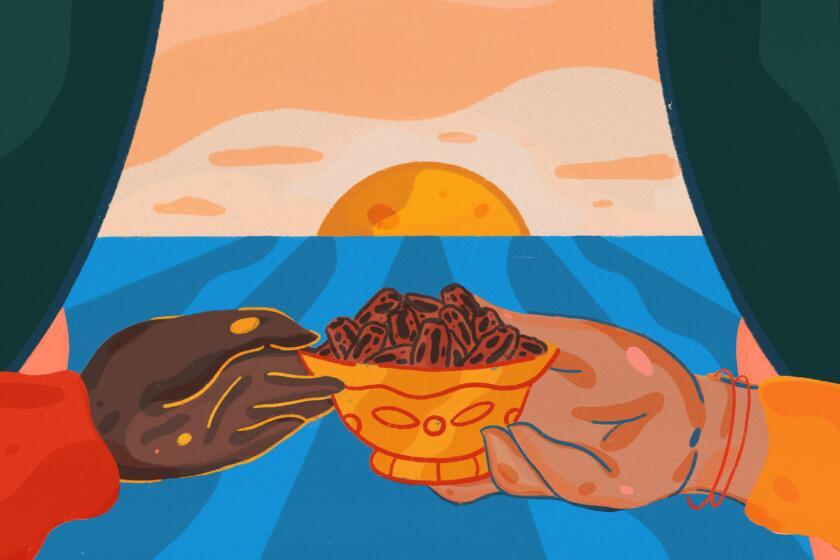Why we cook when the world doesn’t make sense

- Share via
“Juju!! Yalla, open a tin of fava beans and make us breakfast,” our neighbor called out to his wife.
All the neighbors in the five-apartment Jerusalem building where we lived in 1991 had gathered in the yard on a mild morning in January. Missiles were being launched between Iraq and Israel during the Gulf War. We were ordered to shelter in place.
All I remember from the night before was waking up to find my parents in the bedroom I shared with my baby brother, my father adjusting the antenna on his radio in the middle of the night, coughing as he mumbled to my mother, “Saddam’s chemical weapons are less likely to kill us than that bleached towel you put on the floor.”
Guidelines had been to wear masks and use bleach-soaked towels to seal any gaps in doors and windows. My mother had complied with gusto.
By the next morning, the fear had subsided and the neighbors in the apartment building all gathered outside. That’s when Costa, our next-door neighbor, asked his wife to make ful medames — Egyptian fava beans with cumin, garlic and chilies — for breakfast. The families from that time are still friends and recount how, in the midst of a crisis, food was the first thought.
::
I was 3 years old and my memories are undoubtedly put together not just from my own recollections but from the stories I heard of that time — during my first brush with conflict.
The radio was always on in the suburb of Jerusalem where I grew up; Israeli-Palestinian relations were the topic of the hour, every hour for years. Suicide bombings were scattered, although not unusual, and it was a relatively calm time until I turned 13 and the second intifada, a wave of Palestinian uprisings against Israeli occupation, shook our lives.
Schools were shuttered indefinitely, suicide bombs became a weekly occurrence, and we left home only for essentials, a situation I’m reminded of now as we all shelter at home from a threat, perhaps less violent but equally unpredictable.
Weekend outings to malls, movie theaters, markets and swimming pools disappeared, and we spent time only with family. I remember asking for permission to go out with my friends to a restaurant — or to walk around town — and the answer was always swift and unequivocal: “It’s not safe, we can’t let you go.” I argued the way a teenager would but eventually succumbed, my fear and survival instincts winning over my risk-tolerant teenage brain.
My mother made a cake or a dish I liked for every outing I couldn’t go to, a silent compensation for the childhood I was missing out on.
There was vermicelli toasted in butter, then cooked in sugar syrup or hot cocoa with a dash of clove and allspice to make up for a small disappointment. If I appeared particularly heartbroken, there was chicken stuffed with haswheh, a rice, beef and pine nut pilaf. To this day, it remains my favorite dish, my ultimate comfort food. Sometimes she would disappear upstairs, leaving me alone, knowing how much I loved to experiment with cooking if I was free to roam as I pleased in the kitchen.
Fasting is a ritual practiced by all religions.
For two of the wars on Gaza — one the summer of my freshman year at the University of Pennsylvania and another during the winter break from my first year in business school — I was back home visiting my family.
Again, the environment was charged, and we mostly stayed put at home. But in the evenings, relatives and friends would come to visit — everyone would be glued to the TV — and there was always cardamom coffee and malateet or makarona (savory or sweet aniseed crackers) on the coffee table.
In the summer there were bowls of watermelon and roasted watermelon seeds for cracking. In the winter, oranges from our trees and wheatberry pudding garnished with pomegranates. The topic of the hour was naturally heavy, the scenes on the TV were enough to break even the hardest of hearts, and the frustration at this never-ending cycle exasperating. Yet the food was a reminder, despite the weight of what we were witnessing, that we were still alive with plenty for which to be grateful.
Over the last few weeks, recollections of my childhood, and of those times, have flickered in and out of my mind. The parallels are striking.
My 6- and 4-year-old girls are going through an experience that no parenting book has a chapter on. They don’t understand why a yearlong awaited trip to visit their grandparents in Jerusalem had to be canceled two days before leaving. They don’t fully grasp why they have to see their teachers on a screen and why they can’t meet their friends and chase them around.
“Why can’t we visit Seedo and Teta?” they ask repeatedly about their other grandparents, who live 20 minutes away. I hear them playing with their doll house and the tragedies that strike their dolls are “dying from coronavirus,” much like my dolls “died from missile strikes” when I was their age.
So what do I do? I don’t do worksheets or math problems — I’ve come to terms with the fact that I am neither a good nor a patient teacher. Instead, we cook.
We use a pasta maker — one girl rolling, the other catching — to make udon noodles and fettucine.
We make curries (“chica mika masala” as my 4-year-old calls it) and bibimbap like my older daughter’s best friend’s family introduced us to.
We make Palestinian holiday cookies — not the semolina ones eaten across the Levant around Easter but the very particular ones made with aniseed, fennel and nigella seeds that remind me of Ramadan at my grandparents’ house — and my daughters roll the date paste and put the “eyes” on the snake-like rings with chopsticks.
We FaceTime our friends and family as we cook; we reminisce about good old times and plan for future ones. Even as we are isolated from each other in the same streets and towns and certainly isolated from each other across the world, the food somehow brings us together.
I’ve wondered for the last few weeks why people are baking more than at peak holiday season, making flour and yeast disappear from grocery shelves. Instagram is overrun with live cooking videos; every joke I have received from friends across the world has centered on food.
Yes, we have more free time and are bored. But like nothing else, food gives us the immediate sense of satisfaction and comfort — the one that bubbles in our bellies up to our hearts, because we have satisfied a specific need such as hunger, or because it has quelled our boredom and loneliness. But that kind of happiness, as we all know, is short-lived.
But it seems to me we cook during these times because it gives this senseless time meaning. It connects us to a past we are afraid we may never recover. It reminds us of our childhoods, of friendships we have built, of countries we have visited and foreign cultures we have embraced.
Most important, it shows us that there is still beauty in simple things — like watching our children experiment in the kitchen, savoring a cookbook (or any book) rather than swallowing it, and cooking alone or with others (even if virtually) for the sake of it, not just to get a 30-minute dinner on the table.
When the heaviness of current circumstances is shared with others, its weight is divided instead of amplified. Cooking shows us that we are all connected, that for the first time in our living memories, everyone in the entire world is facing the same problem. It shows us that we are not alone.
It is this sense of connection, which we can build through food, that gets us through the day, because really, each day is the only guarantee we have.
The bleach stain from the time of the Gulf War remained on my childhood bedroom carpet until we moved out of that apartment five years later, a reminder of how we are always one step away from disaster.
But the food of those days, the dishes I reach for today, is also a reminder of how even during the scariest times, we can find a sense of connection with others, a sense of meaning and purpose, and sometimes, even if only for a fluttering moment, that feels enough.
Reem Kassis is a Philadelphia-based writer and James Beard-nominated author of “The Palestinian Table.”
More to Read
Eat your way across L.A.
Get our weekly Tasting Notes newsletter for reviews, news and more.
You may occasionally receive promotional content from the Los Angeles Times.










